
Optimization Letters
Scope & Guideline
Elevating Optimization Science to New Heights
Introduction
Aims and Scopes
- Optimization Algorithms:
The journal publishes research on a variety of optimization algorithms, including but not limited to metaheuristic methods, gradient-based approaches, and exact algorithms. This includes work on convergence properties, complexity analysis, and improvements to existing methodologies. - Applications of Optimization:
Research that applies optimization techniques to real-world problems is a core focus. This includes applications in logistics, finance, engineering, and healthcare, where optimization plays a crucial role in decision-making processes. - Theoretical Foundations:
The journal emphasizes the theoretical aspects of optimization, including duality theory, optimality conditions, and convex analysis. Papers that develop new theoretical frameworks or extend existing theories are welcomed. - Stochastic and Robust Optimization:
There is a significant focus on stochastic optimization and robust optimization techniques. This includes research that addresses uncertainty in optimization problems, providing solutions that are effective under varying conditions. - Multi-objective Optimization:
Papers addressing multi-objective optimization problems, where multiple criteria must be optimized simultaneously, are a significant area of interest. This includes both theoretical developments and practical algorithms. - Machine Learning and Optimization:
The intersection of machine learning and optimization is increasingly relevant, with papers exploring how optimization techniques can enhance machine learning algorithms and vice versa.
Trending and Emerging
- Data-Driven Optimization:
There is a growing trend towards optimization techniques that leverage data, such as machine learning-based optimization and data-driven decision-making frameworks. This reflects the increasing importance of big data in optimization. - Robust and Adaptive Optimization:
Research in robust and adaptive optimization methods is on the rise, particularly in contexts where uncertainty is a significant factor. This includes robust optimization frameworks that ensure solutions remain effective under varying conditions. - Optimization in Network Design and Logistics:
The application of optimization techniques to network design problems, including vehicle routing, logistics, and supply chain optimization, is gaining traction. This reflects the practical need for efficient solutions in these critical areas. - Complex Systems and Nonconvex Optimization:
There is an increasing interest in optimizing complex systems that involve nonconvex functions and constraints. Researchers are exploring new methods to tackle these challenging problems. - Integration of Optimization with AI and Machine Learning:
The integration of optimization techniques with artificial intelligence (AI) and machine learning is a rapidly growing field. This includes applications where optimization algorithms enhance machine learning models and vice versa.
Declining or Waning
- Traditional Linear Programming:
The focus on classical linear programming techniques seems to be diminishing, as more complex and high-dimensional optimization problems gain attention. Researchers are increasingly exploring nonlinear, stochastic, and combinatorial optimization. - Single-criteria Optimization:
There is a noticeable decline in papers dedicated solely to single-criteria optimization problems. The trend is shifting towards multi-objective optimization, where multiple criteria are considered simultaneously. - Basic Algorithmic Approaches:
Papers that propose basic or straightforward algorithmic approaches without significant improvements or novel insights are becoming less common, as the field increasingly favors innovative and advanced algorithmic strategies.
Similar Journals
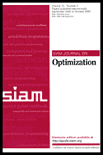
SIAM JOURNAL ON OPTIMIZATION
Championing high-quality research in optimization.SIAM Journal on Optimization is a prestigious academic journal published by SIAM Publications, dedicated to advancing the field of optimization within applied mathematics, theoretical computer science, and software. Since its inception in 1991, the journal has maintained a rigorous commitment to publishing high-quality research that drives innovation and application in optimization theory and methodology. With a significant impact factor and currently ranking in the Q1 quartile across various academic categories, the journal serves as an essential platform for researchers, professionals, and students aiming to contribute to this dynamic field. Although it does not currently offer open access, the journal's robust reputation and extensive reach make it an invaluable resource for those looking to stay at the forefront of optimization research. Based in Philadelphia, PA, this journal plays a crucial role in disseminating pivotal findings that enhance both theoretical understanding and practical applications of optimization in diverse domains.
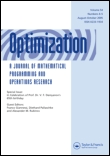
OPTIMIZATION
Fostering excellence in the study of optimization since 1985.OPTIMIZATION is a distinguished scholarly journal published by TAYLOR & FRANCIS LTD, catering to the vibrant fields of Applied Mathematics, Control and Optimization, and Management Science and Operations Research. With an ISSN of 0233-1934 and an E-ISSN of 1029-4945, this journal serves as a crucial platform for researchers, practitioners, and students alike, presenting cutting-edge research and innovative methodologies since its inception in 1985. With its current standing in the Q2 category across multiple fields as of 2023, OPTIMIZATION underscores its impact and relevance in the academic community, attracting high-quality contributions and fostering knowledge dissemination. Though it operates under a traditional access model, the journal ensures that its rigorous peer-reviewed content remains accessible to a wide audience, reflecting the latest advancements in optimization techniques and their applications in real-world scenarios. Whether you’re looking to deepen your understanding of optimization principles or apply these insights within your own research, OPTIMIZATION is an essential resource for advancing your knowledge and expertise in this dynamic field.

Algorithms
Connecting Researchers in the Evolving World of Algorithms.Algorithms is a prestigious and innovative journal published by MDPI, focusing on the rapidly evolving fields of computational mathematics, numerical analysis, and theoretical computer science. Launched in 2008, this open access journal seeks to foster collaboration and knowledge sharing among researchers, professionals, and students by providing a platform for the dissemination of high-quality research articles, reviews, and notes. With its operational base in Basel, Switzerland, Algorithms has steadily established itself in the academic community, achieving commendable rankings such as Q2 in Computational Mathematics and Numerical Analysis, as well as Q3 in Computational Theory and Mathematics and Theoretical Computer Science as of 2023. Furthermore, the journal boasts impressive Scopus rankings, placing it within the top 20% in several categories, underscoring its relevance and influence in the field. As an open access journal, Algorithms ensures that its content is accessible to all, promoting the advancement of algorithmic research and fostering critical discussions that may shape the future of the discipline.
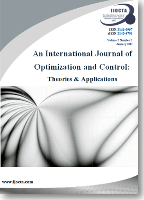
International Journal of Optimization and Control-Theories & Applications-IJOCTA
Catalyzing Innovation in Optimization and Control Theories.International Journal of Optimization and Control-Theories & Applications (IJOCTA), published by Ramazan Yaman, stands as a pivotal platform in the fields of applied mathematics and control optimization. With an ISSN of 2146-0957 and an E-ISSN of 2146-5703, IJOCTA has embraced an Open Access model since 2011, ensuring that its scholarly contributions are widely accessible to researchers, professionals, and students alike. Based in Turkey at the Istanbul Atlas University, the journal is committed to advancing the scope of optimization and control theories, featuring comprehensive studies that bridge theoretical foundations with practical applications. Despite its relatively recent surge, IJOCTA has achieved impressive standings, including a Q3 quartile ranking in both Applied Mathematics and Control and Optimization for 2023, alongside commendable Scopus rankings (Rank #192 in Applied Mathematics and Rank #44 in Control and Optimization). These metrics underscore the journal’s growing significance and impact within the global research community, making it an invaluable resource for those seeking to explore contemporary developments in optimization and control.

OPTIMIZATION AND ENGINEERING
Catalyzing Progress in Engineering through Optimization InsightsOPTIMIZATION AND ENGINEERING, published by SPRINGER, is a leading academic journal that has been at the forefront of cutting-edge research since its inception in 2005. Operating from the Netherlands, this journal serves as a key platform for disseminating innovative findings across multiple disciplines, including Aerospace Engineering, Civil and Structural Engineering, Control and Optimization, Electrical and Electronic Engineering, Mechanical Engineering, and Software. Notably, it has achieved a commendable Q2 ranking across various fields as of 2023, illustrating its growing influence and impact in the scientific community. The journal ranks impressively in Scopus, with control and optimization articles placed in the 79th percentile. The articles published cover a broad spectrum of optimization theories and their applications, appealing not only to seasoned researchers and professionals but also to emerging talents in the field. While it does not offer open access options, the availability through reputable institutions ensures that vital insights reach a wide audience. This makes OPTIMIZATION AND ENGINEERING an indispensable resource for anyone interested in the latest advancements and methodologies in optimization and engineering.

Journal of the Operations Research Society of China
Empowering Decisions, Transforming Research.Journal of the Operations Research Society of China, published by SPRINGER HEIDELBERG, stands as a pivotal platform for advancing the fields of Operations Research, Applied Mathematics, and Decision Sciences. With an ISSN of 2194-668X and an E-ISSN of 2194-6698, this journal not only serves as a conduit for innovative research from 2013 to 2024 but also maintains a commendable Q2 ranking in Applied Mathematics and Mathematics (miscellaneous), reflecting its impact and relevance in the academic community. Situated in the United States, the journal fosters an interdisciplinary approach, inviting researchers, practitioners, and students to engage with cutting-edge findings and methodologies. Although currently not an Open Access journal, it offers a wealth of knowledge that empowers professionals in management science and operations research, as evidenced by its rankings—53rd out of 399 in general mathematics and 194th out of 635 in applied mathematics. This positioning highlights the journal's commitment to quality, contributing significantly to the body of knowledge in these dynamic fields.
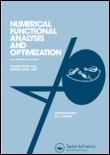
NUMERICAL FUNCTIONAL ANALYSIS AND OPTIMIZATION
Exploring the intersection of theory and application in optimization.NUMERICAL FUNCTIONAL ANALYSIS AND OPTIMIZATION, published by Taylor & Francis Inc, is a premier international journal dedicated to advancing the fields of analysis, optimization, and applied mathematics. With its ISSN 0163-0563 and E-ISSN 1532-2467, this journal has established itself as a vital resource for researchers and practitioners seeking to explore innovative methodologies and applications. Covering a broad spectrum of topics intersecting mathematical analysis and computer science, it has consistently ranked in the Q2 tier for Analysis and Control and Optimization categories and is well-regarded in the communities of Signal Processing and Computer Science Applications. The journal's commitment to publishing high-quality research ensures significant contributions to solving complex problems in various fields, making it an essential reference for students, academics, and industry professionals. With a publishing history dating back to 1979, it encourages the dissemination of groundbreaking ideas and practical methodologies, fostering a collaborative academic environment. Access to the published articles may vary, so contributors and readers are encouraged to engage with the latest findings and ongoing research through the journal’s platform.
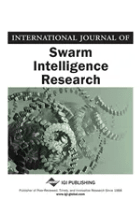
International Journal of Swarm Intelligence Research
Fostering Innovation through Natural Systems PrinciplesInternational Journal of Swarm Intelligence Research, published by IGI Global, stands at the forefront of research in the dynamic field of artificial intelligence, focusing specifically on swarm intelligence and its applications. With an ISSN of 1947-9263 and an E-ISSN of 1947-9271, this journal has carved a niche within academia since its inception, boasting a commendable Q3 rank in the categories of Artificial Intelligence, Computational Theory and Mathematics, and Computer Science Applications as of 2023. The journal spans vital research from the years 2017 to 2024, fostering an environment that welcomes innovative studies that apply natural systems principles to computational methodologies. Although not classified as Open Access, the journal remains accessible to a broad audience, providing vital insights and fostering discussion among researchers, professionals, and students delving into cutting-edge swarm intelligence topics. As such, this journal is an essential resource for those aiming to advance their understanding and application of these transformative technologies.
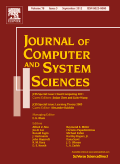
JOURNAL OF COMPUTER AND SYSTEM SCIENCES
Pioneering insights in computer science and systems analysis.The Journal of Computer and System Sciences is a distinguished publication founded in 1967 and continually striving to push the boundaries of knowledge in computer science and applied mathematics. Published by Academic Press Inc, Elsevier Science, this journal boasts impressive credentials, holding a Q1 quartile ranking across multiple categories including Applied Mathematics, Computational Theory and Mathematics, Computer Networks and Communications, and Theoretical Computer Science as of 2023. With a focus on innovative research and comprehensive theoretical developments, this journal serves as a pivotal forum for authors and readers alike, facilitating cutting-edge contributions to the field. The journal is not currently open access, providing a curated selection of high-quality articles for its subscription residents. By engaging with this journal, researchers, professionals, and students can gain insight into the latest trends, prominent methodologies, and significant findings that shape the modern landscape of computing and systems analysis.

COMPUTATIONAL OPTIMIZATION AND APPLICATIONS
Innovating Solutions Through Mathematical MasteryCOMPUTATIONAL OPTIMIZATION AND APPLICATIONS, published by Springer, stands as a leading journal in the fields of Applied Mathematics, Computational Mathematics, and Control and Optimization, showcasing a distinguished impact factor that underscores its relevance and scholarly influence. With its ISSN 0926-6003 and E-ISSN 1573-2894, this journal serves as a vital platform for researchers and professionals to discuss advancements in computational methods and optimization techniques, fostering interdisciplinary collaboration. Operating from the Netherlands and established in 1992, it covers works that push the boundaries of mathematical theory and practical applications. With an impressive standing in Scopus rankings—placing it in the top quartile for prominent mathematics disciplines—its rich archive and ongoing contributions are essential for anyone looking to contribute to or stay updated in these evolving areas. The journal's commitment to quality and innovation makes it an indispensable resource for academia and industry alike, ensuring that readers can engage with the most current research and developments in computational optimization.